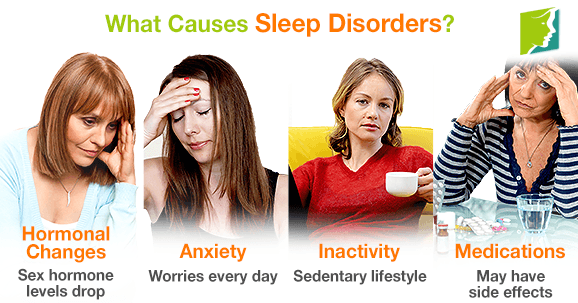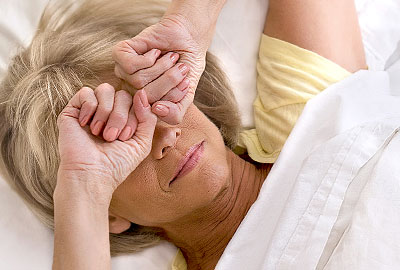Sleep disorders can develop over time, especially during menopause, and be disruptive. Not being able to get a full night's rest can really damper your energy levels and overall quality of life. Whether you have insomnia and can't fall asleep, or sleep apnea and wake up during the night gasping for air, these conditions can take a toll on your health and happiness.
It is helpful to understand what causes sleep disorders. When you are informed of the underlying causes for your lack of slumber, you can better address the issue. Understand your body and reclaim your dreams.
Hormonal Changes
Quick Fix
Consuming phytoestrogenic herbs, such as black cohosh and dong quai, can restore estrogen levels and regulate sleeping patterns.
During menopause, there is a dramatic drop in hormonal production. Estrogen and progesterone levels fluctuate and decline, which often causes sleep disorders during this life transition. The lack of estrogen directly lowers the release of a neurotransmitter called melatonin, which can make it hard to fall asleep and prevent your muscles from fully relaxing. Also, progesterone plays a role in inducing sleepiness, so that can keep you up as well.
Anxiety
Quick Fix
Every day, put on relaxing music, close your eyes, and breathe deeply for 20 minutes. Meditation is known to prevent anxiety episodes and improve sleep quality.
If you have a lot of stress in your life, falling asleep can be challenging. Worries take up a lot of head space that should be reserved for a quality night's sleep. This can be due to the stresses of menopause, responsibilities of everyday life, and even hormones. Hormonal changes can also affect your mood. Estrogen reduction causes a decrease in relaxing brain chemicals like serotonin and endorphins, as well as an increase in a stress hormone called cortisol.
Inactivity
Quick Fix
Incorporate 3 hours of physical activity into your week through brisk walking, dancing, or yoga.
If you lead a sedentary lifestyle, it can be harder to fall asleep when the night comes. When your body in inactive and immobile all day, you do not tire yourself out. Those who get ample physical activity throughout the day naturally fall into deeper sleep.
Medications
Quick Fix
If medications for sleep issues are not working for you, try a valerian supplement or tea. The herb is known to induce sleepiness.
Many medications, whether they be pain relievers or anti-depressants, can cause sleep disorders as a side effect. As individuals get older, they typically consume more medications, which is correlated with insomnia and other sleep disorders. Make sure to thoroughly check the labels of your prescriptions and over-the-counter medications.
Now that you understand the causes of sleep disorders, it is time to be proactive. Although some of the factors are impossible to avoid - like hormonal changes - you can overcome your nerves, be more active, and eliminate foods and prescription drugs that may be disturbing your rest. Sleep is the most important part of your day, so do not let anything take it away from you.
Sources
- National Institutes of Health. (2013). Sleep Disorders. Retrieved April 22, 2013, from http://www.nlm.nih.gov/medlineplus/sleepdisorders.html
- University of Maryland Medical Center. (2013). Adult Sleep Disorders. Retrieved April 22, 2014, from http://umm.edu/programs/sleep/health/sleep-disorders/adult
- University of Maryland Medical Center. (2011). Valerian. Retrieved April 22, 2014, from http://umm.edu/health/medical/altmed/herb/valerian




